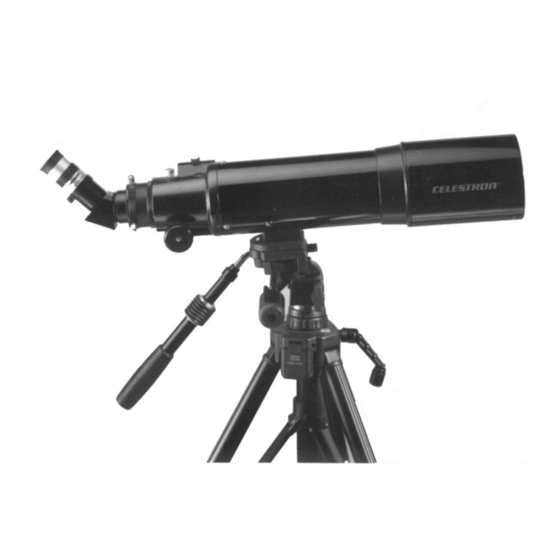
Subscribe to Our Youtube Channel
Summary of Contents for Celestron Wide View 52260
- Page 1 80mm Wide View Spotting Scope (#52260) 102mm Wide View Spotting Scope (#52270) INSTRUCTION MANUAL...
-
Page 2: How To Use This Manual
How to Use this Manual This manual explains the proper use of your Celestron spotting scope —from initial set up to on- going use. This manual is broken down into several sections. The first covers attaching your spotting scope to a stable platform, like a photographic tripod, so that the standard accessories can be attached. -
Page 3: Getting Started
Photographic Tripod For best results, attach your Celestron spotting scope to a photographic tripod like the Celestron Photographic Tripod (#93596) or any fairly rigid photographic tripod. To attach your spotting scope to the tripod: 1. - Page 4 The Wide View Spotting Scope This section covers the correct set up and operating procedures for your Celestron 80mm or 102mm Wide View spotting scope and includes information on visual and photographic observations. The Wide View spotting scope uses a classical refractor optical design with a two- element (achromatic) lens made of crown and flint glass.
-
Page 5: Removing The Lens Cover
Removing the Lens Cover To protect your spotting scope, the objective lens, focuser, and accessories are fitted with protective covers. All are tension-fitted and easily removed by pulling off. The covers should be removed as each piece is installed. Once removed, place the covers in the box to ensure they won’t get lost. -
Page 6: Aligning The Finderscope
presses tightly between the finderscope and the inside of the bracket. Tighten the three adjustment screws until they make contact with the finderscope body. See figure 3a. 2. Slide the finder bracket (attached to the finderscope) into the mounting bracket on the spotting scope. - Page 7 Used with an eyepiece it increases the magnification. The amount of the increase depends on the lens itself and its position in the optical system. Celestron offers Barlow lenses for 1-1/4” eyepieces (#93506 & #93507). Using Your Wide View Spotting Scope Photographically Your Spotting Scope can be used photographically as well as visually.
-
Page 8: Attaching A Camera
Attaching a Camera To attach a camera to your Wide View Spotter: 1. Remove all visual accessories. 2. Thread the proper T-Ring onto the built-in T-Adapter threads at the end of the eyepiece holder. 3. Mount your camera body onto the T-Ring the same as you would any other lens. Focusing The Camera The focusing mechanism is the same photographically and visually. -
Page 9: Calculating Magnification (Power)
VISUAL OBSERVING INFORMATION Focusing When working with any optical instrument, there are several focusing hints that will ensure that you get the sharpest possible image. The hints listed here are for visual observing and photography. Never look through glass. Glass found in household windows is optically imperfect and may vary in thickness from one location to the next. -
Page 10: Field Of View
PHOTOGRAPHY HINTS Metering Celestron spotting scopes have fixed apertures and, as a result, fixed f/ratios. To properly expose your subjects photographically, you need to set your shutter speed accordingly. Most 35mm SLR cameras offer through-the-lens metering which lets you know if your picture is under or overexposed. -
Page 11: Observing The Sun
A spotting scope is nothing more than a telescope that produces correctly oriented images. That is why all Celestron spotting scopes are so well-suited for looking around the Earth. But this in no way limits the spotting scope to terrestrial use. On the contrary, the 102mm Wide View spotting scopes work well as an astronomical telescope for observing the sky. -
Page 12: Observing Deep Sky Objects
Milky Way. Because your spotting scope is not set up for serious astronomical observing, you will need to know where to look in the sky for these objects. The Celestron Sky Maps (#93722) will help you locate the brightest deep sky objects. -
Page 13: Care And Cleaning Of The Optics
40% distilled water. Or liquid dish soap diluted with water (a couple of drops per one quart of water) can be used. Internal adjustments and cleaning should be done only by the Celestron repair department. If your spotting scope is in need of internal cleaning, please contact the factory for service. -
Page 14: Celestron Two Year Warranty
Celestron, is found to be defective in materials or workmanship. As a condition to the obligation of Celestron to repair or replace such product, the product must be returned to Celestron together with proof-of-purchase satisfactory to Celestron. - Page 16 2835 Columbia Street Torrance, CA 90503 (310)328-9560 (310) 212-5835 (FAX) Web site: http:\\www.celestron.com Copyright 2002 Celestron All rights reserved. Products or instructions may change without notice or obligation. Printed in China 10-02...
















Need help?
Do you have a question about the Wide View 52260 and is the answer not in the manual?
Questions and answers